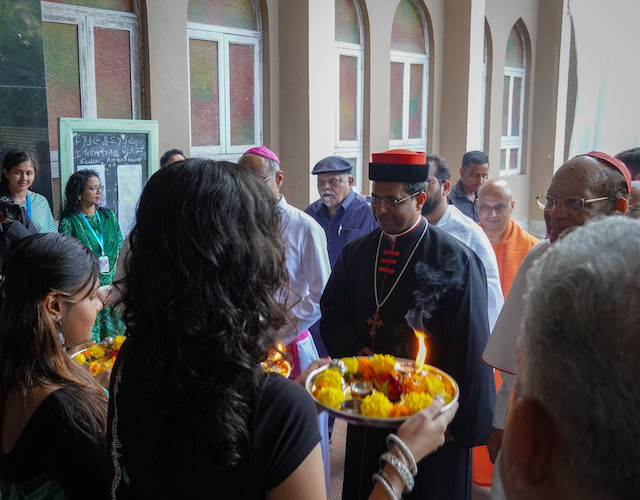Inter-faith Leaders Ignite Rays of Hope at St. Andrew's College
- Archdiocese of Bombay

- Oct 6, 2025
- 4 min read
Mumbai, October 5, 2025 – In the heart of Mumbai, where the cacophony of urban life often drowns out whispers of harmony, a symphony of faith was being played on October 4 at St. Andrew's College, Bandra. Under the banner, “Pilgrims of Hope – Religions Journeying for Peace,” religious leaders from various faith traditions across the metropolis wove a tapestry of unity, reminding us that in diversity lies our greatest strength. Organised by the Inter-religious Dialogue Commission of the Archdiocese of Bombay and the College's Inter-religious Cell, this gathering—timed on the feast of St. Francis of Assisi in the Jubilee Year 2025—became a beacon of inspiration, urging humanity to rise above division, and to embrace shared dreams of peace.
In a world torn apart by intolerance and strife, the event drew civic leaders, scholars, peace activists, and everyday dreamers, all united in the transformative power of dialogue. Cardinal George Jacob Koovakad, Prefect of the Dicastery for Interreligious Dialogue at the Vatican, stood as the evening's guiding light, his words a clarion call for reconciliation through faith.
The event unfolded like a sacred pilgrimage in two profound acts. First, an intimate interaction where luminaries shared visions of “faith for building bridges”. Voices echoed from Mar Thomas Elavanal, MCBS; Archbishop John Rodrigues, Cardinal Oswald Gracias, Bishops Dominic Savio Fernandes and Allwyn D’Silva; Swami Dayadhipananda of Ramakrishna Mission Hospital; Ervad Dr Parvez M. Bajan, Head Priest of Byculla Fire Temple; Dr Surinder Kaur representing the Sikh community; Dr Bhadant Rahul Bodhi Mahathero from Sarvodaya Maha Buddha Vihara; Mr Ezra Moses of Gate of Heaven Synagogue; Prabhu Govind Das Swamy and Prabhu Keshav Chandra Das Swamy from ISKCON; Sadguru Yogiraj Dr Mangeshda; Maulana Zaheer Abbas Rizvi; Maulana Iliyas Khan Falahi, State President of Jamat-e-Islami Hind; and Swami Devendra Brahmachari from the Jain tradition. Their stories, rich with wisdom, painted a portrait of hope, where differences dissolve into shared humanity.
Transitioning to St Andrew’s College, the dignitaries were enveloped in warmth by Principal, Dr Sybil Thomas, and the Managing Trustee, Fr Nigel Barrett. Floral tributes bloomed like promises of friendship, and the traditional aarti was a symbol of light piercing the darkness, honouring every path to the divine.
In St. Andrew's College Auditorium, hosted by the eloquent Adrian Rosario, the programme started with garlanding of the dignitaries and the lamp-lighting—a ritual evoking a spirit of unity. Archbishop John Rodrigues' welcome address stirred souls, proclaiming each attendee an "ambassador of peace," inviting all to walk the path of understanding with open hearts.
The cultural mosaic that followed was a feast for the spirit. A children's dance to "Mile Sur Mera Tumhara" swirled like a whirlwind of national harmony, their innocent steps a reminder that peace begins in young hearts. A street play revived the timeless encounter between St Francis of Assisi and the Sultan of Egypt, Malek Al-Kamil, breathing life into history's lessons of courageous dialogue.
"Anam Prem ki Kahaniyan" unfolded tales of love in myriad communities, fostering empathy that transcended borders. A video on the Archdiocese's inter-religious dialogue course (BIRD) showcased its ripple effects, transforming society, one conversation at a time.
The Sikh martial arts display pulsated with disciplined energy, symbolising unity's unyielding strength. The Focolare Movement's "Patterns of Unity" wove threads of shared values, while "Vrindavan ki Kathayein" highlighted the work of ISKCON. A video message from Mr Suhail Khandwani was followed by a Sufi musical presentation. Mr Vijay Benedict, a former playback singer sang song of praise in "Sukhun ke Sur"—a symphony where every note sang of peace. A very powerful presentation of Bhaichara (a play by Safdar Hashmi) enacted by students of the Hindi department of Mumbai University had everyone engrossed.
Cardinal Oswald Gracias then introduced Cardinal Koovakad, setting the stage for a message that would echo far beyond the walls of the auditorium.
In his keynote, Cardinal Koovakad invoked St Francis of Assisi as a "pioneer of inter-religious dialogue" who "sowed seeds of peace." Marking the 60th anniversary of Nostra Aetate, he celebrated its global legacy: "We rejoice for the tremendous role this document has played in promoting dialogue... inspiring fraternity, friendship, unity and solidarity for the good of humanity."
Quoting Pope Francis on the Holy Spirit as a "font of peace and love," and Pope Benedict XVI on dialogue as a "journey together towards the source of Light," he confronted today's shadows—discrimination, violence—with a rallying cry: Become "pilgrims of hope," bringing light to the poor, suffering, and marginalised. Religion, he affirmed, quoting Pope Leo XIV, is a "wellspring of healing and reconciliation," where faith "unites more than it divides."
Urging perseverance, he declared inter-religious dialogue "a necessary condition for peace," calling all to be "builders of peace who sow seeds of goodness." The programme crested with the Paranjoti Academy Chorus’ melodious medley, their voices soaring through two songs before uniting in the National Anthem in a crescendo of collective aspiration.
As the event drew to a close, optimism bloomed like dawn after the night. Participants departed as renewed pilgrims, carrying rays of hope. The Organisers deemed it a milestone, fortifying Mumbai's spirit of pluralism—a testament that when faiths journey together, peace is not a distant dream, but a living reality we can all be part of.
Press Office
Archdiocese of Bombay


































